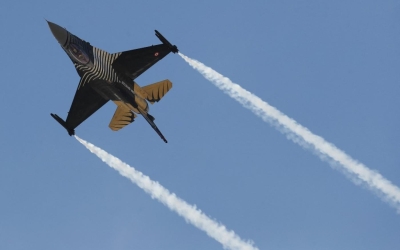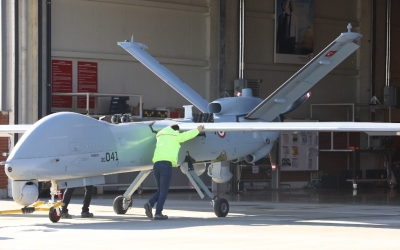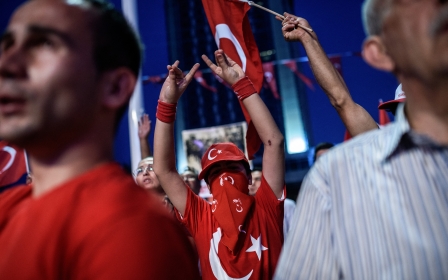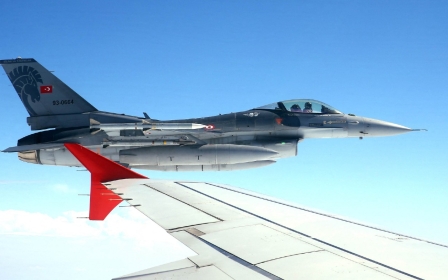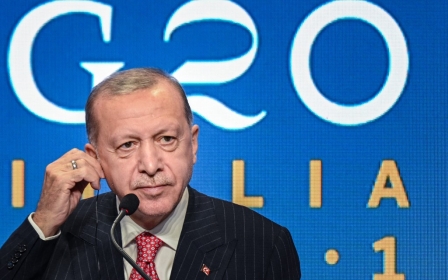Can Russia help Turkey build its fifth-generation TF-X stealth fighter?
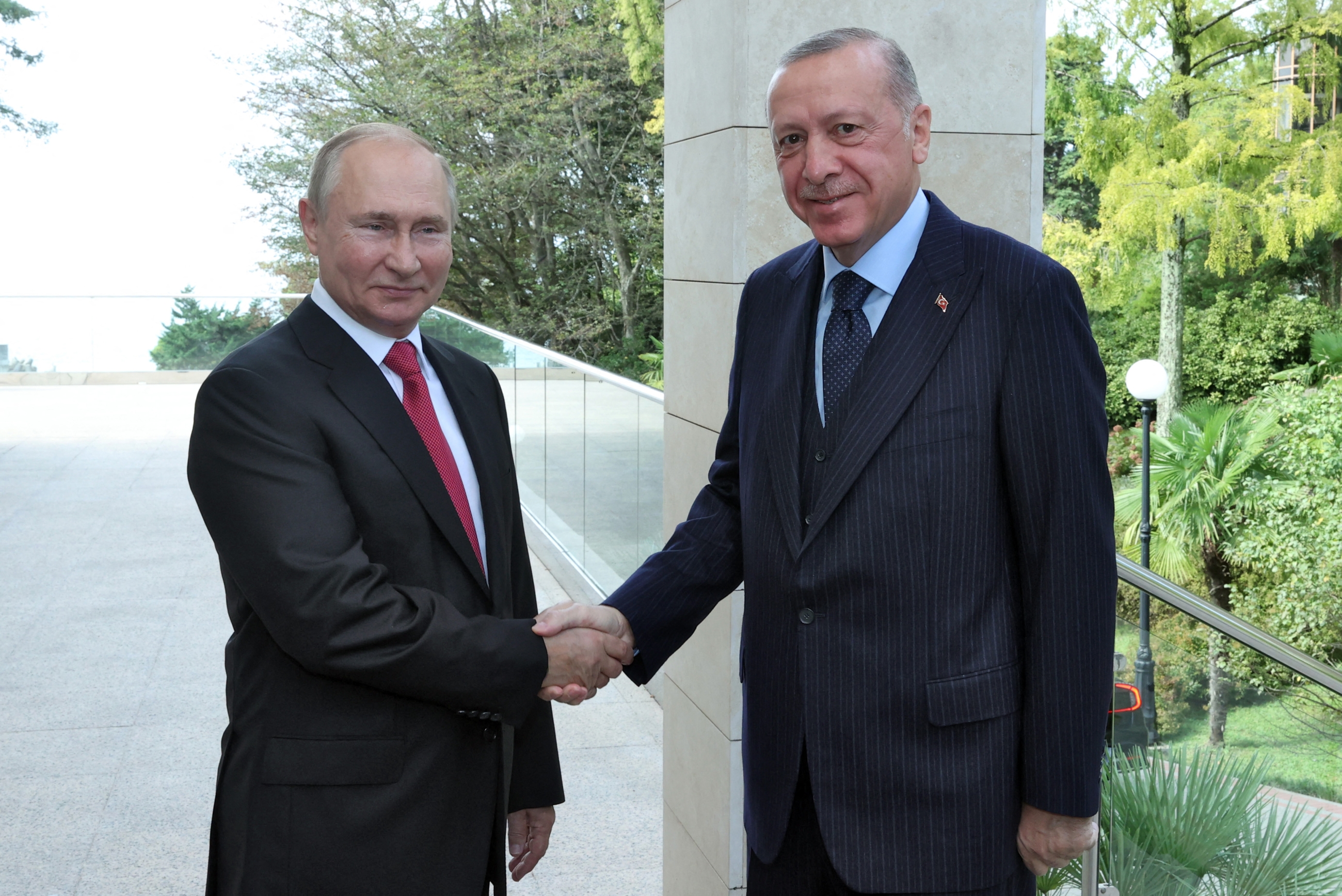
Turkey's ambitious project to develop a fifth-generation stealth fighter, the TAI TF-X, has proven incredibly difficult for Ankara. But experts say close technical cooperation with Russia could help get a fully functional version of its national fighter jet off the ground.
In late September, feeling embittered after being snubbed by US President Joe Biden at the United Nations General Assembly, Turkish President Recep Tayyip Erdogan flew to the Russian resort city of Sochi and met with his Russian counterpart Vladimir Putin.
After that meeting, Erdogan said they had discussed the prospect of jointly manufacturing jet engines and warships.
"We even comprehensively talked about the steps we can take on [building] jet engines," he said.
If Turkey wants to develop a genuine fifth-generation fighter, it will need to develop a fifth-generation engine to power it. Experts say that could be an extremely difficult feat for even the most technologically advanced countries.
New MEE newsletter: Jerusalem Dispatch
Sign up to get the latest insights and analysis on Israel-Palestine, alongside Turkey Unpacked and other MEE newsletters
Abdurrahman Seref Can, the aircraft department head at Turkey's Presidency of Defence Industries (SSB), has acknowledged that the first block or version of the TF-X will be a fourth-generation jet.
Without a truly fifth-generation engine, the best Turkey can ever hope to build is a 4.5-generation TF-X jet that lacks key stealth and other features which make a fighter fifth-generation.
'Ready to share our expertise'
There were some indicators that Russia and Turkey might work together on the TF-X before Erdogan's September meeting with Putin. In late August, Russia's state-run TASS News reported that Moscow and Ankara were holding consultations on possible cooperation developing the TF-X.
"At this stage, consultations are underway with the Turkish side at the level of specialised groups on the issues of interaction on creating the Turkish national fighter," said Dmitry Shugayev, the director of Russia's Federal Service for Military-Technical Cooperation.
"In this regard, there are interesting areas where we could render technological assistance, considering the experience that our specialists possess in developing and manufacturing aircraft," he added. "And we are ready to share our expertise with our Turkish partners."
"But it is premature to talk about specific details at this stage."
Shortly after, in early September, Ismail Demir, the chair of SSB, said that Turkey's "door is open" to any allied country "who want to be part of this project".
In 2018, Demir stressed that Turkey wanted to have all the rights to the final version of any engine for the TF-X that it jointly develops and builds with foreign companies.
"An engine that belongs fully to us is our red line," he said at the time. "Since we know it will be a long process, we will work with those who want to produce an intermediary engine."
But even if Russia and Turkey cooperate closely in building a full-fledged fifth-generation engine for the TF-X, they will most likely find the task immensely challenging.
"The engine is a critical and extremely challenging part of the challenge for any country looking to develop a next-generation combat aircraft," Justin Bronk, research fellow for airpower and technology in the military science team at the Royal United Services Institution (RUSI), told Middle East Eye.
"In addition to the traditional requirements for thrust-to-weight and fuel efficiency goals, next-generation fighter aircraft will also require engines which can supply an unprecedented amount of onboard electrical power to supply sensors, electronic warfare equipment and potentially even directed energy capabilities later in their service lives," he added.
Russia to date has failed to produce a "mature" fifth-generation engine to power its own stealth fighter, the Su-57 Felon. Its existing Su-57s are powered by AL-41F1 turbofan engines rather than the long-awaited Izdeliye 30.
"I think that there is a serious possibility of Turkey and Russia agreeing to work together on a collaborative development programme, given Turkish political differences with its fellow Nato partners," Bronk said.
Cooperation between competitors
Michael Kofman, director of the Russia studies programme at the CNA Corporation and a fellow at the Woodrow Wilson International Center's Kennan Institute, is sceptical that Russia and Turkey will collaborate on the project.
"The two are competitors, and with the Su-75 mockup being rolled out this summer, it is even more likely the two countries would be going after the same lower-cost single-engine fifth-generation market," Kofman told MEE.
The Su-75 "Checkmate" is a fifth-generation single-engine fighter jet Russia is developing for its military and export. Turkey also plans to offer the TF-X for export after it eventually finishes the development phase and begins serial production of the fighter.
"Russia has not completed its Izdeliye 30 engine, although I expect it will, but I doubt it will offer this engine to the Turkish TF-X," Kofman said. "No, they're not going to help them build an engine."
"At best, Turkey might be able to source a complete engine from Russia, which itself is deeply unlikely," he added. "Why would Russia help Turkey develop a competing engine so that Turkey can then try to rival Russian aerospace industries on the export market?"
In addition to Turkey's inability to develop a fifth-generation engine, Kofman is also doubtful that it can develop many of the other advanced components and systems needed to make a fifth-generation fighter jet.
"Building low-cost propeller-driven UCAVs (unmanned combat aerial vehicles), and building a fifth-generation jet fighter, are very different ball games," he said.
Risking sanctions
Emily Hawthorne, Stratfor's senior Middle East and North Africa analyst at RANE, on the other hand, believes that "it's likely that Turkey and Russia will reach an agreement that sees Russia provide off and on technical assistance to Turkey, including engineers and knowledge transfer, to help Turkey build out the TF-X."
"But Turkey is also seeking assistance from a wide range of other partners, including European partners, so the TF-X programme is hardly something we should consider a solely Turkish-Russian collaboration," Hawthorne told MEE.
"If anything, to me, it indicates just how seriously Turkey is taking the issue of building out its own domestic military industry, with help from a wide range of global partners," she added.
Then there are the broader implications of Turkey militarily cooperating with Russia, such as the constant risk of straining its long-standing strategic ties with the United Nations and the Nato alliance.
Hawthorne points out that the risk of additional sanctions "especially comes into play if Turkey procures actual components or equipment from Russia".
Turkey has already had US sanctions imposed on SSB and Demir for purchasing and taking delivery of advanced Russian S-400 air defence missile systems.
Procurement of those missiles also got it removed from the fifth-generation F-35 Joint Strike Fighter programme and banned from buying any of those stealth fighters for its air force.
"The US has been clear about its willingness to put additional sanctions on Turkey if it buys more equipment from Russia," Hawthorne said.
"Turkey has sought to mollify its western partners recently, including the United States, but Turkey also clearly has every intention to deepen its relationship with Russia if it serves Turkey's own domestic defence industry and needs, so Ankara will keep playing this balancing act," she added.
Middle East Eye delivers independent and unrivalled coverage and analysis of the Middle East, North Africa and beyond. To learn more about republishing this content and the associated fees, please fill out this form. More about MEE can be found here.


